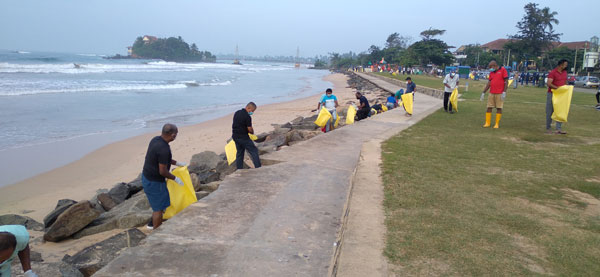News
End silo approach to marine research, scientist urges
It is to Sri Lanka’s credit that there are so many bodies engaged in ocean science research but it is vital that data is pooled so that the country can learn how to use marine resources without destroying them, a leading scientist said.
Professor Charitha Pattiaratchi’s call comes at the start of the United Nations’ Decade of Ocean Science for Sustainable Development (2021-31), aimed at raising awareness of the challenges and opportunities provided by the oceans.
Among the many government agencies involved in marine research are the National Aquatic Resources Research and Development Agency (NARA), Department of Fisheries Resources, Department of Coast Conservation, the navy and coast guards, as well as the Department of Meteorology and the Disaster Management Centre, which collect data on specific aspects of oceans.
Then there are the universities conducting oceanic research, with the Ocean University and University of Ruhuna in the lead. Added to this are non-governmental organisations and private research bodies studying ocean sciences.
“It is important to share data and to have proper coordination of the different responsibilities in order to achieve better results in the area of ocean science” said Dr. Pattiaratchi, Professor of Coastal Oceanography of the University of Western Australia’s Ocean’s Institute.
“Sri Lanka also has an International Centre of Excellence on the Marine Environment sponsored by the Indian Ocean Rim Association (IORA). This has been dormant for many years and the ocean decade could be a good starting point to reactivate it,” Prof. Pattiaratchi pointed out.
Research is critical for Sri Lanka’s fishing industry. Lack of scientific data has led many fish species to the brink of extinction due to overfishing, marine biologist Daniel Fernando, co-founder of Blue Resources Trust, told the Sunday Times. Mr. Fernando recommends that the government increase monitoring of the fishing industry and work closely with NGOs in research.
NARA said it wants to increase research activity in the Ocean Decade. It said it continues to collect data on fish stocks in Sri Lankan waters, building on the survey initiated by the Norwegian research vessel, Dr Fridtjof Nansen in 2018.
NARA’s research vessel, Samudrika, has been conducting marine research around Sri Lanka since 2012, the head of NARA’s Marine Biological Resources Division, Dr. Sisira Haputhantri, said.
The Chairman of the National Science Foundation, Prof. Ranjith Senaratne, points out that while the country has about 200 degree courses, only a handful of these relate to oceanic science.
“Only about six courses (less than 3 per cent) deal with fisheries and ocean sciences. This is despite the fact that Sri Lanka has an Exclusive Economic Zone (maritime area) eight times its landmass,” Prof. Senaratne, a former vice chairman of the University Grants Commission, said.
“Given the fact that Sri Lanka’s future prosperity lies in the ocean, Sri Lankan universities should offer more courses related to fisheries, marine science, marine engineering, ocean resource engineering, port management., sea sports and maritime recreation, nautical science, fibreglass technology and boat-building and so on.

State-of-the-art Norwegian research vessel Dr Fridtjof Nansen conducted research in Sri Lanka
“We need to harness the biological, chemical and physical marine resources of the country which hitherto remain almost untouched and untapped,” Prof. Senaratne said.
Prof. Pattiaratchi said that while the populations of Australia and Sri Lanka are similar in numbers, there were about 1,000 times more scientists working on ocean research.
“Lack of interest in studying ocean sciences could also be cultural,” he pointed out, noting that in Sri Lanka, most people aspire to become doctors and engineers, with very few taking up ocean sciences.
“Sri Lankans have very limited interaction with the sea. We do not have a culture of using the sea for recreation work such as swimming, surfing or diving so, there is a lack of interaction with the ocean and a lack of new blood wanting to become ocean explorers,” said Dr. Pattiaratchi, adding that he had been determined from the age of 14 to become a marine scientist.
| Pioneering clean-up by Matara volunteers A hundred volunteers gathered at Matara beach for clean-up operations heard how important their work was in a country where many fail to understand the importance of ensuring a clean ocean. The head of the Marine Environment Protection Authority, Dr. Terney Pradeep Kumara, told the volunteers cleaning up Matara’s main beach on the Poya holiday last month that they were acting on one of the Ocean Decade’s priorities: eliminating sources of ocean pollution. The Matara operation was important for the area: beach cleaning programmes are common at beaches closer to Colombo but rarely found elsewhere. A speciality of the programme at Matara is that it is driven purely by volunteers. Its mastermind, eye surgeon Dr. Priyanga Iddawela, said that having been raised in Kandy he lacked interaction with the ocean. He urged residents of coastal areas not to pollute their environment. | |

|



